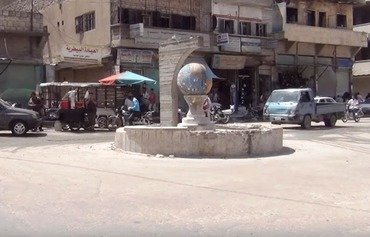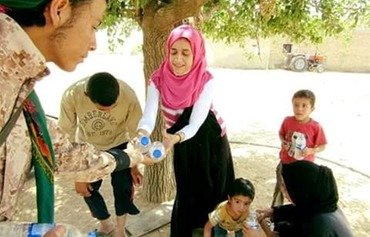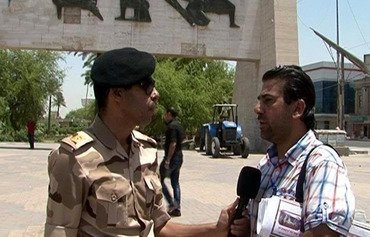Journalists and media professionals covering the military operations against the "Islamic State of Iraq and the Levant" (ISIL) in northern Syria tell Diyaruna they face constant danger while reporting the news, with many losing their lives in the process.
ISIL does not respect the "moral code of war", said Kurdistan 24 channel correspondent Akram Saleh, who was one of the first journalists to cover the battle against ISIL in northern Syria.
Saleh was first embedded with the Kurdish People’s Protection Units (YPG) and then with the Syrian Democratic Forces (SDF), and is now with the Manbij Military Council (MMC), where he has been reporting on the battle for Manbij.
Owing to his work on the front lines, he told Diyaruna, he has come to consider "all areas to be dangerous, because of the possibility of the presence of sleeper cells left behind by ISIL elements and the latter’s use of thermal rockets".
ISIL has in many cases planted the areas it leaves behind with mines, he added, and its use of car bombs poses a serious threat.
He said he was injured while covering the fighting in al-Hasakeh earlier this year while trying to get away from a car bomb that ISIL had directed at his team.
In light of these dangers, Saleh said he puts "caution first, also familiarity with the geography of the area and knowledge of ISIL’s fronts".
MMC forces, for example, try as much as possible to keep journalists away from very dangerous areas, he said, and allow them to move about after mine sweeping and clearing operations are completed.
"The channel I work for obligates me to take protective measures, such as wearing a helmet and body armour, and has warned us more than once that failure to take protective measures makes us subject to penalties," he said.
Journalists killed on the job
"Many of those who work in the media field in northern Syria, and Kobani and Manbij and their rural areas specifically, were killed while doing field coverage of the ongoing war against ISIL," media activist and Kobani native Saleh Muslim Mohammed told Diyaruna.
Among them was "Mazloum Bagok, who lost his life on September 28, 2014, and Rewan Zagros, who lost his life on December 21, 2014, and martyr Agiri Yilmaz, who lost her life on April 13, 2015, in the village of Khan Mamed in the Kobani region, while covering the campaign to liberate Kobani", he said.
"Arin Joudi was killed in a landmine explosion on January 31, 2016, in al-Hawl area in al-Hasakeh while doing her work, and Behoz Horan, born in 1995, was killed in Kobani on January 1, 2015, while covering the clashes with ISIL inside the city of Kobani," he added.
The latest to be killed was Mustafa Mohammed Shoukri, who was wounded during the campaign to liberate Manbij on July 13th, and was martyred later at a Qamishli hospital on July 19th, Mohammed said.
"ISIL is directly targeting journalists in the northern Syria region, and ISIL elements are deliberately and systematically committing acts of violence, in violation of all international conventions," Mohammed said.
Complex media landscape
Cairo University faculty of media professor Hassan Afifi told Diyaruna there are typically two types of journalists during wartime: the embedded journalist and the war correspondent.
In the Syrian war, the matter is more complex, he said, as young journalists have emerged who work for foreign agencies or local websites and agencies, while others do media coverage as part of their relief work or as activists.
The treatment of journalists by armed factions, including ISIL, deviates from all accepted war-time standards, he said, "as this group does not abide by any international law and pays no mind to international conventions".
"So you see journalists getting injured or killed while covering the fighting, both through direct targeting and in shelling or mine explosions," Afifi said.
He called on journalistic institutions that are active in the region to focus attention on the methods of covering battles involving ISIL and to train journalists how to operate on the battlefront, with an emphasis on safety.

![Journalist Akram Saleh stands at the entrance to Tel Abyad after it was liberated from the 'Islamic State of Iraq and the Levant'. He has been covering the war in northern Syria for four years. [Photo courtesy of Saleh]](/cnmi_di/images/2016/08/17/6003-Syria-journalist-saleh-600_384.jpg)







May God reward you!
Reply1 Comment(s)